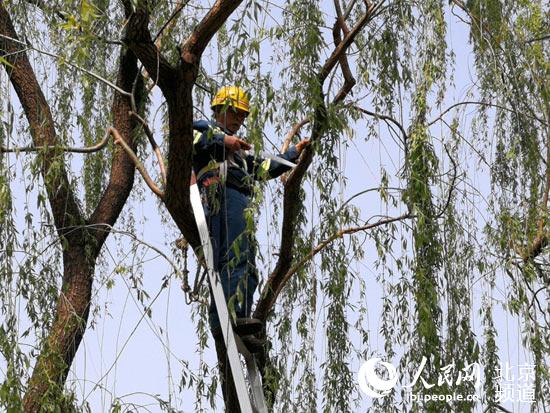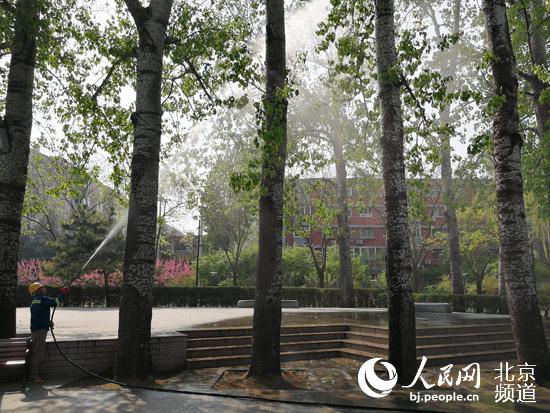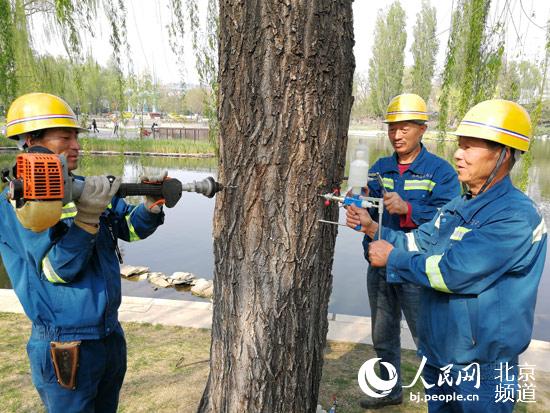

Spring has definitely sprung, and in doing so Beijing's yearly battle with the ever present Catkin problem begins.

A worker removes flowering branches.
During this season, female poplar and willow trees shed their light, fluffy seeds, better known as catkins, which are carried away by the wind to reseed. However, these spring snowflakes cause allergies among Beijing residents which can cause throat and nasal problems.
According to Zhang Zhixiang, a professor at Beijing Forestry University, poplar trees in Beijing were originally planted in the 1960's and 70's, when Chinese cities developing green areas was still a new process, and the selection of tree species was relatively small. Poplar and willow are suitable for the soil and climate of Beijing, easy to reproduce and live, and grow fast with low maintenance costs, so they become the main tree species for Beijing.

A worker sprays trees with water.
Although many people have called for the trees to be cut down, experts such as Zhang Zhixiang say this is not the answer, as these trees help produce oxygen and absorb carbon dioxide from around the city. In response, the Beijing City Garden Afforestation Bureau has this week set about sterilizing 300,000 trees across the city. By injecting the trees with a bud-inhibiting chemical, the trees will not bud and therefore the catkin seeds will not be released into the air, alleviating the irritation caused to those that suffer from hay fever.
Workers have also been pruning trees to remove flowering branches as well as spraying trees with water to catch as many of the Catkins as possible. It's hoped that these measures, along with plans to increase green spaces in Beijing by 1,648 acres this year, will mean that locals can enjoy a greener Beijing without an aversion to the city's trees.

Workers inject a tree with a bud-inhibiting chemical.
 Fire brigade in Shanghai holds group wedding
Fire brigade in Shanghai holds group wedding Tourists enjoy ice sculptures in Datan Town, north China
Tourists enjoy ice sculptures in Datan Town, north China Sunset scenery of Dayan Pagoda in Xi'an
Sunset scenery of Dayan Pagoda in Xi'an Tourists have fun at scenic spot in Nanlong Town, NW China
Tourists have fun at scenic spot in Nanlong Town, NW China Harbin attracts tourists by making best use of ice in winter
Harbin attracts tourists by making best use of ice in winter In pics: FIS Alpine Ski Women's World Cup Slalom
In pics: FIS Alpine Ski Women's World Cup Slalom Black-necked cranes rest at reservoir in Lhunzhub County, Lhasa
Black-necked cranes rest at reservoir in Lhunzhub County, Lhasa China's FAST telescope will be available to foreign scientists in April
China's FAST telescope will be available to foreign scientists in April "She power" plays indispensable role in poverty alleviation
"She power" plays indispensable role in poverty alleviation Top 10 world news events of People's Daily in 2020
Top 10 world news events of People's Daily in 2020 Top 10 China news events of People's Daily in 2020
Top 10 China news events of People's Daily in 2020 Top 10 media buzzwords of 2020
Top 10 media buzzwords of 2020 Year-ender:10 major tourism stories of 2020
Year-ender:10 major tourism stories of 2020 No interference in Venezuelan issues
No interference in Venezuelan issues
 Biz prepares for trade spat
Biz prepares for trade spat
 Broadcasting Continent
Broadcasting Continent Australia wins Chinese CEOs as US loses
Australia wins Chinese CEOs as US loses